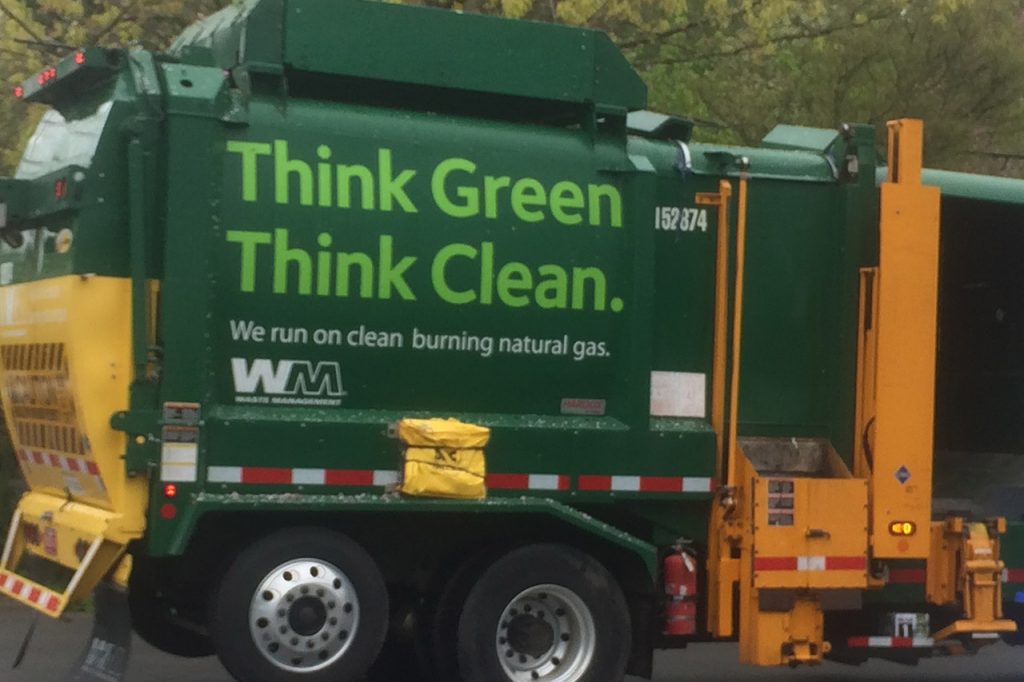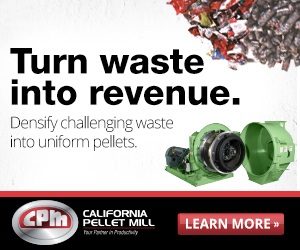
Revenue from Waste Management’s recycling business fell by 20% last year, but earnings were nearly flat. | Dan Leif/Resource Recycling, Inc.
Lower commodity prices continued to batter recycling revenues for the largest garbage and recycling companies last year. But recent moves to charge communities for MRF processing helped soften the financial blow.
The five largest publicly traded residential waste haulers and MRF operators recently reported their fourth-quarter and full-year 2019 financial results.
From largest to smallest (in terms of total revenue), those companies are Waste Management, Republic Services, Waste Connections, Advanced Disposal Services and Casella Waste Systems.
The top four experienced decreases in recycling revenues in 2019: a drop of 20% for Waste Management, 8% for Republic, 31% for Waste Connections and 43% for Advanced.
Casella enjoyed a 1% recycling revenue increase.
The companies continue to be affected by depressed commodity values, particularly for OCC and other paper grades, driven largely by import restrictions in China and other Asian countries. Ever since China launched its National Sword campaign, the haulers have been experiencing market pains. They’ve responded by charging customers more to sort and sell recyclables.
John Morris, chief operating officer for Waste Management, said his company overcame decreasing commodity sales revenues with customer fees last year. As a result, recycling business earnings were only down by about $2 million, or roughly flat.
“Our recycling performance demonstrates the success we are having in restructuring and recycling contracts to a fee-for-service model,” he said during a Feb. 13 call with investors.
The following is more detail on each company’s results:
Fees reduce operating losses
Waste Management’s recycling business brought in $240 million in revenue during the fourth quarter of 2019, down 29% year over year, according to a company press release. For the full year, recycling revenues totaled $1.04 billion, down 20% from 2018 (the numbers above include revenue from the company’s commodities brokerage business).
According to the release, in the fourth quarter, the operating EBITDA (earnings before interest, taxes, depreciation and amortization) fell by $12 million year over year. But for the full year, operating EBITDA was nearly flat.
“The company achieved this outcome in spite of a 35% decline in market prices for recycled commodities during 2019, due to the continued focus on developing a sustainable recycling business model that meets customers’ environmental needs on a fee-for-service basis,” according to the release.
During the call with investors, Morris said the company tallied a blended average commodity price of $37 per ton during the fourth quarter, down 43% year over year. For the whole year, the average was about $44 per ton.
During the call, Morris also provided an update on its “MRF of the Future,” which is under construction in Chicago. The facility’s sorting technology will use a positive sorting approach to generate high-quality material, Morris said. It will be fully operational during the second quarter of this year.
As of the end of 2019, the company operated 103 MRFs (including facilities that handle C&D debris).
Recycling now brings in over 6% of the company’s total revenues. During the fourth quarter, total company revenues were $3.85 billion, roughly flat year over year. During the full year, revenues totaled $15.46 billion, up nearly 4%.
In April 2019, Waste Management announced it would acquire Advanced Disposal Services, the fourth largest publicly traded residential waste and recyclables hauler in North America. According to Waste Management’s annual report, the company expects to obtain antitrust regulator approval for the transaction by the end of March 2020 and to finalize the acquisition shortly thereafter.
Over one-third of recycling contracts repriced
Meanwhile, Republic Services’ recycling business brought in $60 million in revenue during the fourth quarter, down 23% year over year. For the full year, recycling revenue totaled $273 million, down 8%.
Republic Services calculated the average price for recycled commodities (excluding glass and organics) at $66 per ton, down 38%. For the full year, the average price was $77, down 26%.
“We continue to walk through city hall and tell the message around a model that needs to be economically sustainable, to be environmentally sustainable over time.” – Jon Vander Ark, Republic Services president
Like other companies, Republic Services has worked to reduce its exposure to commodity price changes. According to a press release, through the end of 2019, the company repriced about 36% of its recycling collection contracts. Those contracts represent about 55% of the company’s recycling volumes. The company also implemented a recycling processing charge for its open-market customers.
“As a result, the company’s earnings sensitivity to changes in recycled commodity prices is expected to decrease in 2020,” according to the release.
During a Feb. 13 conference call with investors, Republic Services President Jon Vander Ark said the company continues to renegotiate contracts with municipalities, and it’s finding receptive ears.
“We continue to walk through city hall and tell the message around a model that needs to be economically sustainable, to be environmentally sustainable over time. And I can tell you we’re seeing momentum shift,” he said, according to a transcript from Seeking Alpha.
During the call, Republic President and CEO Don Slager took aim at glass, calling it highly recyclable but noting it has low value. In some regions, he said, the trucking costs to get the glass to an end user “take the whole thing upside down.”
“So, we’ve got to have those honest discussions with generators about whether the material really does have real sustainable environmental value at the end of the day or are we just basically burning more rubber and more fuel to make ourselves feel good,” he said.
About 79% of the recyclables Republic processes are fiber, including OCC, ONP and mixed paper. In 2019, the company sold 2.2 million tons of material, excluding glass and organics, from its MRFs. That was down from 2.4 million tons the year before.
As of the end of 2019, Republic had 79 MRFs.
Recycling now brings in a little over 2% of Republic Services’ revenues. During the fourth quarter, total company revenues were $2.58 billion, up 2% year over year. For the full year, revenues totalled $10.3 billion, up nearly 3%.
Sting from tumble in OCC price
Waste Connections’ recycling business brought in $13 million in revenue during the fourth quarter, down 40% year over year. For the full year, the recycling business brought in $64 million, down 31% from 2018.
Waste Connection acquired a number of companies in 2019. Excluding the revenue impact from those acquisitions, its recycling business brought in $12 million in revenue during the fourth quarter, down 46% year over year.
During a Feb. 13 conference call with investors, company President and CEO Worthing Jackman noted the average price Waste Connection fetched for its OCC was $41 per ton during the fourth quarter, down 56% year over year.
As of the end of 2019, Waste Connections had 66 MRFs.
Recycling now makes up 1% of Waste Connections’ total revenues, according to a company press release. During the fourth quarter, total company revenue was $1.36 billion, up 8%. For the full year, revenue was $5.39 billion, up 9%.
Recycling revenues chopped in half
Advanced Disposal Services’ recycling business brought in $2 million in revenue during the fourth quarter, down 52% year over year, according to a press release. For the full year, the company’s recycling business brought in about $10 million in revenue, down 43% from 2018.
By the numbers
The following is a look at key fourth-quarter recycling-related numbers from the five largest publicly traded residential haulers in North America:
Waste Management
- Recycling revenue (excluding brokerage business): $240 million
- Revenue change YoY: Down 29%
- Commodity price: Average $37 per ton
- Price YoY: Down 43%
Republic Services
- Recycling revenue: $60 million
- Revenue change YoY: Down 23%
- Commodity price: Average $66 per ton (excluding glass and organics)
- Price YoY: Down 38%
Waste Connections
- Recycling revenue: $13 million
- Revenue change YoY: Down 40%
- OCC price: Average $41 per ton
- OCC price YoY: Down 56%
Advanced Disposal Services
- Recycling revenue: $2 million
- Revenue change YoY: Down 52%
Casella Waste Systems
- Recycling revenue: $11 million
- Revenue change YoY: Down 6%
- Commodity price YoY: Down 38%
Advanced collected nearly 653,000 tons of recyclables in 2019, according to the company’s annual report. That weight collected was up less than 1% from 2018.
As of the end of the year, the company had three MRFs and 19 locations where recyclables are received and baled.
Recycling now makes up 0.5% of the company’s revenue. For the fourth quarter, total company service revenue was $401 million, up 1% year over year. For the full year, total revenue was $1.6 billion, up 4%.
Recycling revenue growth seen
Casella Waste Systems’ recycling business brought in nearly $11 million in revenue during the fourth quarter, down 6% year over year. For the full year, the recycling business brought in $43 million, up over 1% from 2018, according to a press release.
The company’s annual report provided more details about the factors affecting Casella Waste Systems’s recycling revenues in 2019. Lower commodity prices reduced revenues by $8.5 million, but higher recycling processing fees brought in an additional $8.0 million and greater commodity weight handled increased revenue by $1.1 million. The net result was a $600,000 increase in recycling revenue in 2019 compared with 2018.
For the last four years, the company has worked to reduce its reliance on commodity prices by renegotiating contracts and charging fees. For example, in 2019, nearly 37% of Casella’s recycling revenues came from commodity sales; that was down from nearly 78% in 2015.
In terms of operating income, the recycling business lost $800,000 in 2019. That was down from a loss of nearly $8 million in 2018.
The company didn’t note what the average commodity price fetched was during the fourth quarter or full year. But, during a Feb. 21 call with investors, a company executive said commodity prices in the fourth quarter were down 38% year over year.
As of the end of January 2020, Casella owned and/or operated 20 MRFs.
Recycling now makes up less than 6% of Casella’s total revenues. During the fourth quarter, total company revenues were $194 million, up 11% year over year. For the full year, revenues totaled $743 million, up 13% over 2018.
More stories about markets
- FV Recycling acquires Mid America Paper Recycling
- Box demand slump signals strain in US economy
- Federal Signal paves new way with acquisition



